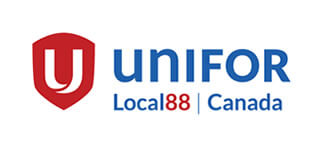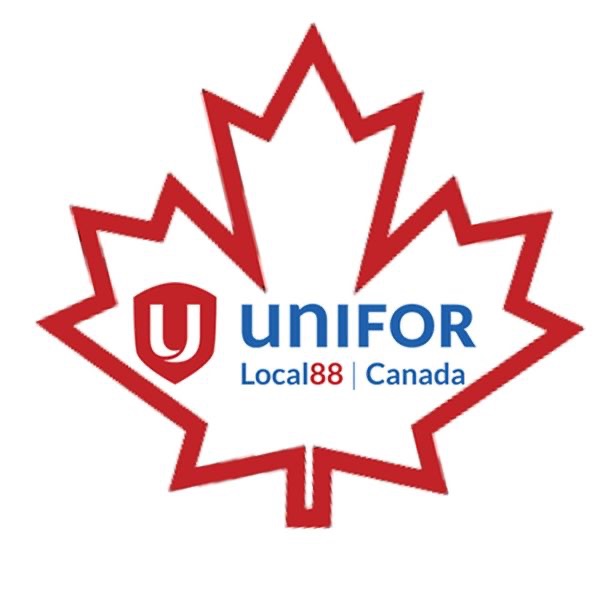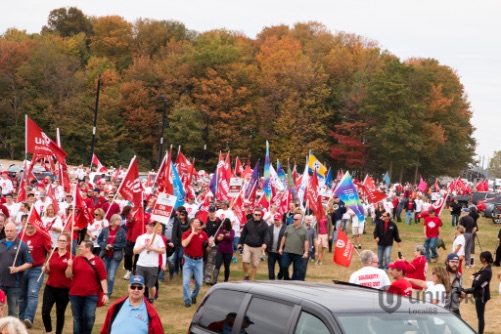Welcome to the page all about Local 88 where you can find information about our Structure and History.
Executive & Units
We are an amalgamated local union which represents workers in the Community of Ingersoll, Ontario and Southwestern Ontario.
Unifor Local 88 represents workers at GM CAMI Assembly Ingersoll, Auto Warehousing Canada, SGS Canada, Doug Coleman Trucking (Ingersoll, St Thomas, Windsor, Kitchener and Owen Sound).
Local 88 represents over 3,500 members and their families.
The executive board is elected every 3 years during the triennial elections from all members in good standing with at least one year of service. The executive officers include president, vice president, financial secretary, recording secretary, guide, sergeant at arms, trustees (3), youth member, retired worker, a skilled trades member from each employer and a chairperson from each employer. All executive board members have voice and vote at executive board meetings.
The executive board meets monthly on the Tuesday prior to the General Membership Meeting.
All decisions and recommendations of the executive board shall be referred to the next General Membership Meeting (Last Sunday of each month).
Since our formation as a local union our members have become known as community leaders, union activists and as an innovative union local. As a membership, we have a history that we are very proud of.
We hope this website will be useful. If you can’t find what you are looking for please do not hesitate to contact us from the Contact Us page.
CAW Local 88 was first organized in December of 1988. The population of our membership at the time it was organized was 150 members. The membership grew in size quickly, as we prepared to build the GEO Tracker, the Suzuki Sidekick, the GEO Metro and Suzuki Swift. By the end of the 1991 calendar year the membership numbered over 1800.
In September 2009 members at AWC Ingersoll decided to leave the Teamsters and join Unifor (CAW at the time). These members drive all vehicles from GM CAMI to the shipping yard. They then load most of the units on rail cars and stage the remaining units for truck carriers.
On March 19, 2012 Unifor Local 88 organized the office and dispatch workers. They are responsible for all the administration and support for the shipping and receiving of units leaving GM CAMI.
Standing Committees
The trade union movement was built by the struggles of working people — including Indigenous and workers of colour.
Unifor advocates for these workers, and encourages their full participation in union life through local union committees, regional council committees and the Aboriginal and Workers of Colour Caucus. Unifor also holds national and regional Aboriginal and Workers of Colour conferences.
For more information on this work send an email to: humanrights@unifor.org
This committee is an ad hoc committee and its role is to catalogue and organize various media and materials to preserve the history of our local.
The membership of this corporation is made up of Local 88 members. This corporation holds title to all real property for the benefit of the Local Union. The Board of Directors of this corporation is the Executive Board members of our Local 88 Union. The duties and responsibilities of this corporation are to oversee the operation of the property and buildings belonging to the Unifor Local 88 Building Corporation. The corporation makes recommendations to the General Membership through the Executive Board.
The Building Corporation meets the last Sunday of the following months (January, March, May, August and October) prior to the General Membership Meeting.
Unifor Local 88 annually funds four (4) bursaries for the sum of $750.00 each.
Unifor Local 88 members’ children graduating from secondary school and entering their first year of post-secondary education in a Canadian institution such as a university, college or technology institute are eligible to apply for the bursaries. These are entrance bursaries only. Students entering their second or further years of study or entering first year after a gap between secondary and post-secondary are not eligible.
The purpose of the Local 88 Communication Committee is to keep the membership informed of the news and activities of the Local and National union. We also aim to keep the members up-to- date on news of a labour/union, industry, automotive, political and social justice nature. We communicate via several methods such as our newsletter Off the Line, this website, app, YouTube, our closed members-only Facebook group, Twitter, ads in local newspapers and radio.
As per Article 10, Section 2 of Local 88 Bylaws the Constitution and Bylaws Committee shall be composed of the President, Vice President, Recording Secretary and Chairperson of the Trustees. The Constitution of Local 88 shall be the Constitution of the UNIFOR National Union and the bylaws of UNIFOR Local 88. The bylaws shall be amended, altered or revised only in conformity with Article 19 of UNIFOR Local 88 Bylaws. The Local Union Constitution and Bylaws Committee meets as needed to review a resolution or motion calling for amendment, alteration or revision of a bylaw.
The committee identifies the education needs of members, committees, and leadership, and organize educational activities meet these needs.
The Election Committee conducts all Local 88 elections when called. The Committee shall have full charge of the elections process and is governed by the Local Bylaws and the UNIFOR National Constitution. It is the responsibility of the Elections Committee to ensure the election is fair and to take charge of the nomination ballots and the voting ballots, to count the votes and inform the membership of the results. The Committee ensures the integrity of the process is maintained.
Only One Earth Our planet faces an environmental crisis of major proportions, one which could challenge our very survival. Unions around the world are striving to address this crisis, while protecting the welfare of working men and women. The UNIFOR is also committed to this task. In 1987, a highly-publicized United Nations environmental report painted a picture of worldwide degradation. The ‘Brundtland Report’ sent out an alarm for aggressive, coordinated action to begin a recovery, and introduced the idea of ‘sustainable development’. The report challenges working people to reject the corporate choice between jobs and the environment. Workers must have the right to choose both economic security and a healthy environment for ourselves, our families and future generations. To do this, we demand input into setting priorities, determining the degree of regulation over private industry, and deciding who pays for clean up and lifestyle changes. This is our world – our only home. From space we have seen how fragile our existence really is. Our earth is like a living organism with a failing respiratory system, poisoned bodily fluids and cancerous skin. For greed and profits our world has been sickened and hurt like the bodies of so many workers. We extend the struggle for health and safety outside our workplace – we fight as UNIFOR members for the health and safety of our world.
Our Union’s Special Role
Corporate priorities are responsible for the degradation of our environment. UNIFOR, as a major industrial and transportation union, needs to be heard on the environment. As a social union, we are committed to finding just solutions. Emissions of noxious pollutants from cars and trucks – hydrocarbons, carbon dioxide and carbon monoxide, nitrogen oxide and sulphur oxide – have helped to create unhealthy cities, acid rain, the greenhouse effect and the depletion of the ozone layer. UNIFOR is committed to helping develop transportation policies that are environmentally sound, yet will not lead to the destruction of the transportation industry. We support high emission control standards to limit pollutants emitted by automobiles. By taking a stand for a cleaner environment through tougher controls on our employers, we reject the blackmail of choosing job security over the environment.
The Right to Refuse to Pollute
Workers’ health is not for sale nor is the health of our world and our children’s world. Our fight for a healthy and safe environment is an extension of our long-standing struggle for a safe and healthy workplace. UNIFOR health and safety and environmental committees know that hazards are not confined to the workplace. The chemicals in our water supply and high rates of cancer and birth defects near some industrial sites, are examples of the clear links between the environment in the workplace and the outside community. UNIFOR health and safety and environmental committees will mount a ‘greenwatch’ to ensure that the environment outside their workplace is not damaged. As workers we need to have the right to refuse to pollute! UNIFOR will fight for ‘whistle blower’ legislation to protect employees who report the crimes of their employers.
Working With Allies
We will continue and extend our work with local environmental activists and organizations. Most green activists understand that workers cannot be expected to pay the penalty, through the loss of their jobs, for decades of corporate environmental neglect. Local union environmental committees and health and safety representatives are UNIFOR emissaries to the green community, province and country. Our union will continue to provide our voice for change within the house of labour provincially and federally.
Education
The corporate community and their government friends have been fast to capitalize on sincere public concern over the environment. The focus of blame quickly shifted to the responsibility of the individual citizen. While ‘blue box’ solutions can play a role, the real issue is to get to the source of the problem and work towards a global approach to environmental cleanup. Formation of committees at the local level, the development of UNIFOR environmental materials, and the utilization of our UNIFOR Education programs and conferences will all promote worker awareness. Just as health and safety activists have gained the necessary skills and expertise to combat hazards in the workplace, so too can worker environmental activists become leaders in salvaging and restoring our community and world environments. For UNIFOR members, the battle for a healthier environment is being fought on many fronts; in the workplace, at the bargaining table, in the community and through political activism. The interests of the union and the environmental movements largely coincide and we must work together at each stage on the four R’s of the future: Reduce, Reuse, Recover, Recycle
By offering solidarity and strength in numbers the Local 88 Flying Squad has historically, and will continue to be a force to be reckoned with. We’ve been very active on many picket lines, protests and days of action over the years. The people we go to support are happy to see us show up and grateful that we stay to the sometimes bitter end. We are also proud to be a group that many of our committees within our own local call on when help is required to implement various activities. When the Local 88 Flying Squad is called upon we respond.
The mandate of the Human Rights Committee is to work both within our local and the community to ensure equal rights for all people regardless of race, sex, creed, colour, marital status, sexual orientation, disability, political or religious affiliation or place of national origin, so long as the perceived rights of one do not infringe upon the rights of another. We will endeavour, in our committee work, to bring awareness and education to our members and the community pertaining tothe struggles and the barriers that are faced still, today, in our workplaces and in society. If you, or anyone you know is interested in becoming a member of this committee (or simply being added to the mailing list), please contact any of the committee members listed below. “Human rights work within the union is not an “addition” to trade union work; it is essential to the very reason for our existence.”
For more information on Human Rights work within Unifor, please visit the Unifor National website.
UNIFOR Local 88 has established a Local Organizing Committee in August 2010. The purpose of the committee is to identified potential workplaces to be organized, to develop strategies around organizing, to participate in organizing drives and to report back to the Executive Board and Membership of UNIFOR Local 88 monthly. The UNIFOR Local 88 Organizing Committee will be made up of members of both local unions. If you are interested or know someone that wants to organize their workplace please contact President Brent Tree at 519-425-0952 x101
Monthly Meetings – The Organizing Committee meets the last Sunday of the following months (January, March, May, August and October) following the General Membership meeting.
The purpose of the Recreation Committee is to organize events such as dances, tournaments and special events that will bring the membership together in solidarity. Annual events that the Recreation committee organizes include:
- Big Brothers/Big Sisters Bowling (May)
- Golf Tournament (May)
- Shutdown Bash (June)
- Labour Day BBQ (September)
- Charity Bike Run (October)
- Texas Hold’em Poker (October)
- Ingersoll Santa Claus Parade (November)
- Teddy Bear Christmas (November)
- New Year’s Eve Dance.
Also we are involved with POEM Council; this council organizes different events within the region of Perth, Oxford, Elgin and Middlesex. This council is made up all the Locals within this region and meet the first Tuesday of each month. Annual events that the POEM Council organizes include:
- Hockey (March)
- Golf (June)
- Fishing Derby (August)
- Euchre Tourney (October)
- Texas Hold’em Poker (October)
- Euchre/Cribbage (November)
In September 2004 CAW Union leaders from across the country met in Port Elgin, Ontario. They unanimously endorsed the creation of a national and local ‘Union in Politics Committees’ or UPCs. According to Ken Lewenza, chair of the national UPC, this new structure will determine and carry out the union’s political actions, on an ‘issue-based’ rather than a ‘party-based’ approach to politics. The purpose of Local 88 Union in Politics Committee is to listen to the membership of our local union as to the political issues that are relevant to Local 88 members and their families Once identified these issues need to be discuss and debated so that the local union may take action on these political issues. Another purpose of Local 88 Union in Politics Committee is to provide the membership with objective information on political issues that are important to their families, union and communities. Our Local Union committee is involved in political action on behalf of the membership. The final purpose of Local 88 Union in Politics Committee is to provide the membership with the information that is needed to carry on a discussion or to debate a political issue with your neighbor, your Federal MP, your Provincial MPP or any other community figure.
The Women’s Committee meets each month except for July and December prior to the General Membership meeting, at 9:30am. We meet for breakfast (BYOB – bring your own breakfast) in the Lounge at the Local 88 Union Hall. All Local 88 women and male allies are encouraged and invited to attend to discuss the issues specific to women in our local and our community. We support several community women’s groups and charities and take part in such events as International Women’s Day, March 8th; December 6th National Day of Remembrance for the 14 women killed at l’École Polytechnique in Montreal on December 6, 1989; and the Oxford County Take Back the Night march each September, among others.
The Youth Committee of Local 88 is committed to creating space for young people within our local union to develop confidence, skills and knowledge to participate in union life and play a role in building our union. We will provide a “home base” from which young workers can build the confidence and skills necessary to become active in local union standing committees, attend general union meetings, write union newsletter articles, develop relationships with the leadership and other union activists, communicate the importance of unions to students, and to work with other progressive organizations in the community to bring about peace, social justice and a healthy, sustainable environment and, more generally, to improve the lives of working people.


